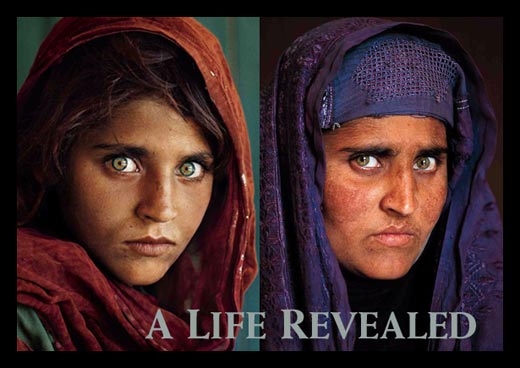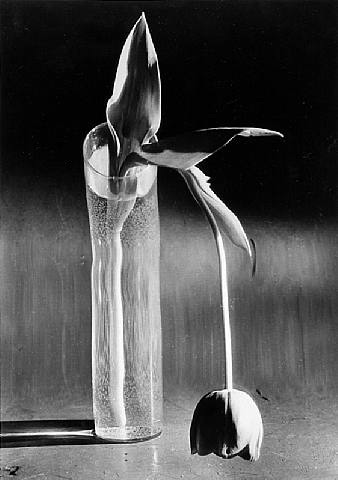Photography podcast #61 talks about what makes a photo great. Given that most of us try hard to produce the best photographs we can, in this podcast we are trying to come up with the criteria needed to create great photographs. I offer my personal opinion on the matter and I’d love to get comments telling me that I’m on to something, or comments telling me that I’m full of it. These two photographs below fit the bill for what I call great photography. I dare you to challenge me on these photos, I dare you. This podcast is based on a suggestion from Mad Aussie in our forum. Many thanks Mad Aussie!

Afghan Girl — Steve McCurry
![]()

Melancholic Tulip — 1939 — Andre Kertesz
Links mentioned in this podcast:
What makes a photo great? (Original thread that inspired this podcast)
Guess what it is thread
The image game
Marko’s January 2009 pick for best member image
Nominate other member’s photographs
Zen And The Art Of Motorcycle Maintenance:an Inquiry Into Values
Assignments on our photography bulletin board:
February 2009 Photo Assignment — Love/Passion/Romance and Red should be a feature
Februrary 2009 — Assignment — photographing words — Shadow
Februrary 2009 — Post processing assignment
Thanks as always to‚Susan and Benny who posted a blog comment about our last podcast and to all the new members of the bulletin board.
If you are looking at this material on any other site except Photography.ca — Please hop on over to the Photography.ca blog and podcast and get this and other photography info directly from the source. I Subscribe with iTunes I Subscribe via RSS feed I Subscribe with Google Reader I Subscribe for free to the Photography podcast — Photography.ca and get all the posts/podcasts by Email
You can download this photography podcast directly by clicking the preceding link or listen to it almost immediately with the embedded player below.
Podcast: Play in new window | Download



Thanks for this helpful, educative and entertaining podcast, from the wilds of your vehicle (recorded with some MP3 equipment?)
I agree with your analysis of greatness, as you say, beyond the ‘story’ feature, we shouldn’t forget the exposure element, freedom from distractions v. important too.
That comparison of the Afghan woman! The left photo is just memorable 100%, but I almost thought the right one was a parody! LOL
Best wishes.
Oh, nearly forgot… Does your title area have no image? It appears on my {Firefox} as just grey… no image?
After reading all of the above essays , er, “comments” I have one thing to add. Are you happy now Mad Aussie? ;0)
Of course, I am aware that the initial question concerned photography rather than painting. I raised the issue of painting because I believe that there is considerable literature on what makes a good (perhaps great) painting and that this might throw light on the issue for photography. It is not apparent to me how the two cases differ in relevant respects with regard to judging greatness. That is, how exactly do the facts that painting has been around longer and has exhibited many more and different styles than photography make a difference in what is required of a photograph for it to be great as distinct from the requirement for a painting tobe great?
In terms of an innate sense of what is great, your intuition about how people would judge two abstracts can, I would think, but put to a simple test: present a series of pairs or triplets of abstracts (or in fact of other types of photos) to a group if people comprising both sophisticates and naifs, and see if their judgments coincide. I think it would be interesting as an initial test to learn the outcome. While perhaps not up to the standard of a scientific experiment, it could serve as a beginning. Note that the selected images do not have to consist of a great and a mediocre image. All may be great, none great, or some mix may be presented. That way, no question is begged concerning which photos are great according to the person selecting the images. In fact, one could have a committee of nearly randomly chosen people select some images and another group choose among them sets of images to be presented to the “subjects” for their judgments.
Please note that I am not predicting an outcome either way, just raising the question and making the observation that your opinion might be supported (or refuted) by data.
I agree that money and the reputation of the artist may have nothing to do with greatness of the work.
Factors such as luck, talent, technical competence are all, in a plain sense I think, external to the photograph itself. What is internal and relevant to judging merit is subject, composition, sharpness or blur, etc.
The photo stands alone, without the photographer alongside to explain it. Whatever luck, competence, and talent the photographer has in making the image may be manifested in the image, but the photographer may not be around to explain the presence or the role of any of these in the photo.
Let me pose another, more radical, question: Is this issue even meaningful, or is it so fraught with ambiguity and vagueness that any answer will be problematic?
Have fun.
Thanks so much for that provocative comment Kent! It is a complicated issue for sure and there will always be those that disagree with the 97% of people that think a certain photograph is great.
Your Pollack example is a good one for sure, but the question was what makes a photo great not what makes a painting great (painting is harder since it’s older and spans many more totally different styles and generations of ‘art lovers’) and it was a member’s suggestion. That said, I still think that if you put 2 abstracts side by side and one of them IS great, most people will choose the great one regardless of the artist that painted it. If it’s not great — th
ey'll tell you neither is great. The monetary value or the notoriety of the artist, for me, does not play into it. I've seen paintings of pure black canvasses that go for hundreds of thousands of dollars. Is that a great painting? NO, imo. Why? again it's the Universal definition that I'm after, not the opinions of rich artsy eggheads that tell me the painting symbolizes death and nothingness.In terms of luck, I agree, sometimes no luck is involved, it is 100% skill and Weston’s peppers are a great example. Photography is so vast though and has so many disciplines and sub-disciplines, and in some of them luck does play a part. (Though I do agree with you — skill by far is the most important aspect in any photograph).
Thanks for the comment and I too am a philosopher, but only after a few beers
Cheers! — Marko
A Very interesting topic. I have a number of ideas (none definitive).
First, the idea that “If it’s great to me, then it’s great.” Isn’t that like a color blind person saying “It’s green to me, so it’s green”? The relative-to-me position is fairly popular (for example, among amateur ethics philosophers), and can’t just be dismissed, but I suspect most people are looking for something a bit more universal.
2nd, an innate aesthetic sense. This is more complicated, but I doubt that Robert Persig had any reliable data to back it up. There is data supporting the view that humans have an innate music faculty, but this does not support a sense of quality. Too complicated to into here. So let me pose a question.
I show you 2 abstract paintings, one by Jackson Pollock and the other by a painter not regarded as very good, much less great. Are you confident that you will be able to distinguish the great one from the mediocre one? Of course, one response might be that Pollock’s work isn’t great. But then that kind of brings us back to “If I think it’s great, then it’s great” view.
Finally, for now anyway, luck. Part of what makes the issue as it has been framed here is the imprecision of the question. One might better ask “Is luck a necessary condition for greatness? A sufficient condition? Both? Neither?
I’d suggest not necessary (except perhaps in a silly sense). Edward Weston’s peppers were carefully selected, the set up was deliberately composed, the lighting arranged, the exposure determined. All this is skill or craft, not luck. So where did luck come in? Well, he was lucky to be alive, lucky that a severe storm did not disrupt his photo session, lucky that he had a camera, etc. But I think these are silly.
Is luck sufficient? I guess that depends on how much luck we’re talking about. Clearly, one can be lucky in finding a striking subject, but not skillful enough to make a good exposure. If we are talking about being Blessed — so lucky that absolutely everything falls into place even tho’ the photographer is inept and the equipment used in in poor condition, etc, then of course, luck is sufficient. But that is an awful lot of luck!
I hope my contribution is not too nerdy. In a past life, I was a (trained) philosopher.
I liked the podcast, but I have a very different opinion on what makes your photo a good one and it starts with Sweat (effort), Language (what you want to say) and Creativity (How you will say it and light it), and the last say 20% will be shared by Technique, Luck, Location, Models and Background.
Thanks Steven…I know, I know I’m SO damn Canadian(Says marko in a low tone non-threatening voice) LOL.
Great and educational as always but you need to stop apologizing for having your own opinions lol.